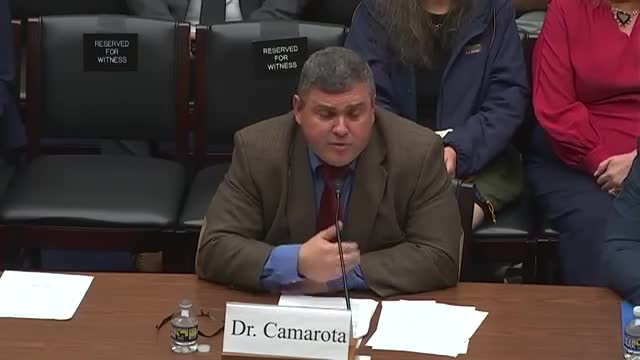Immigration Debate Heats Up Amid Record Border Crossings
September 25, 2024 | Oversight and Reform: House Committee, Standing Committees - House & Senate, Congressional Hearings Compilation
This article was created by AI summarizing key points discussed. AI makes mistakes, so for full details and context, please refer to the video of the full meeting. Please report any errors so we can fix them. Report an error »

In a recent government meeting, officials engaged in a heated debate over immigration policies and their implications for the U.S. economy and public safety. The discussions highlighted the complexities surrounding legal and illegal immigration, with a focus on the Biden administration's handling of border security and the impact of immigration on labor markets.
One key point raised was the assertion that the U.S. legal immigration system is the most generous globally, with approximately 40 million foreign-born residents living legally in the country. However, the meeting also addressed the controversial claim that the Biden administration has allowed 7 million illegal immigrants to enter since taking office, which some argued has strained public services and posed fiscal challenges.
Concerns were voiced about the economic impact of immigration on wages and job availability. Some participants argued that an influx of immigrants could lead to downward pressure on wages, making jobs less attractive for native-born Americans. This sentiment was echoed by former union representatives who expressed fears that immigrants were \"stealing\" jobs from American workers.
The meeting also delved into the humanitarian aspects of immigration, particularly the dangers faced by migrants. Testimonies revealed alarming statistics about the prevalence of sexual assault among women crossing the border, with many reportedly taking birth control in anticipation of such violence. This highlighted the urgent need for comprehensive immigration reform that addresses both security and humanitarian concerns.
Discussions also touched on the relationship between immigration and crime rates. Some officials presented data suggesting that immigrants commit crimes at lower rates than native-born citizens, countering claims that immigration contributes to rising crime. However, others pointed to specific incidents involving illegal immigrants committing crimes, emphasizing the need for stricter enforcement of immigration laws.
The meeting concluded with a call for a fact-based approach to immigration policy, urging participants to rely on accurate data rather than anecdotal evidence. As the debate continues, the complexities of immigration remain a contentious issue, with significant implications for the economy, public safety, and the lives of millions of individuals seeking a better life in the United States.
One key point raised was the assertion that the U.S. legal immigration system is the most generous globally, with approximately 40 million foreign-born residents living legally in the country. However, the meeting also addressed the controversial claim that the Biden administration has allowed 7 million illegal immigrants to enter since taking office, which some argued has strained public services and posed fiscal challenges.
Concerns were voiced about the economic impact of immigration on wages and job availability. Some participants argued that an influx of immigrants could lead to downward pressure on wages, making jobs less attractive for native-born Americans. This sentiment was echoed by former union representatives who expressed fears that immigrants were \"stealing\" jobs from American workers.
The meeting also delved into the humanitarian aspects of immigration, particularly the dangers faced by migrants. Testimonies revealed alarming statistics about the prevalence of sexual assault among women crossing the border, with many reportedly taking birth control in anticipation of such violence. This highlighted the urgent need for comprehensive immigration reform that addresses both security and humanitarian concerns.
Discussions also touched on the relationship between immigration and crime rates. Some officials presented data suggesting that immigrants commit crimes at lower rates than native-born citizens, countering claims that immigration contributes to rising crime. However, others pointed to specific incidents involving illegal immigrants committing crimes, emphasizing the need for stricter enforcement of immigration laws.
The meeting concluded with a call for a fact-based approach to immigration policy, urging participants to rely on accurate data rather than anecdotal evidence. As the debate continues, the complexities of immigration remain a contentious issue, with significant implications for the economy, public safety, and the lives of millions of individuals seeking a better life in the United States.
View full meeting
This article is based on a recent meeting—watch the full video and explore the complete transcript for deeper insights into the discussion.
View full meeting